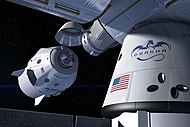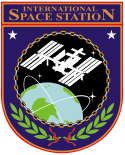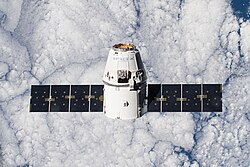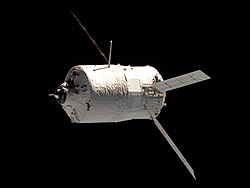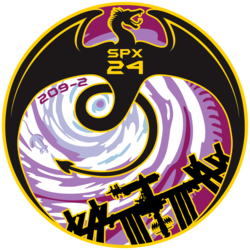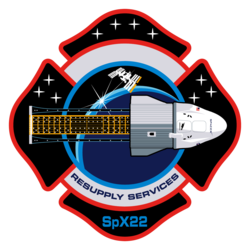SpaceX CRS-23
| SpaceX CRS-23 | |||
 | |||
| Beställare | NASA | ||
|---|---|---|---|
| Tillverkare | SpaceX | ||
| Modell | Dragon | ||
| Farkost | C208 | ||
| Operatör | SpaceX | ||
| Färdens tid | 32 dagar, 19 tim, 42 min | ||
| NSSDC-ID | 2021-078A[1] | ||
| Uppskjutning | |||
| Startplats | Kennedy Space Center LC-39 | ||
| Raket | Falcon 9 Block 5 (B1061.4) | ||
| Uppskjutning | 29 augusti 2021, 07:14:49 UTC[2] | ||
| Landning | |||
| Landningsplats | Mexikanska golfen | ||
| Landningstid | 1 oktober 2021, 02:57 UTC | ||
| Omloppsbana | |||
| Banlutning | 51,6° | ||
| Dockning | |||
| Rymdstation | ISS | ||
| Dockning | 30 augusti 2021, 14:30 UTC[3] | ||
| Dockningsport | PMA-2/IDA-2 (Harmony, för) | ||
| Ur dockning | 30 september 2021, 13:12 UTC | ||
| Tid dockad | 30 dagar, 22 tim, 42 min | ||
| Kronologi | |||
| |||
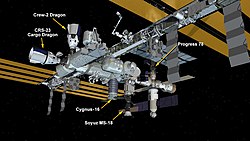
SpaceX CRS-23 eller SpX-23 var en obemannad flygning till Internationella rymdstationen med SpaceX:s rymdfarkost Dragon 2. Farkosten sköts upp av en Falcon 9-raket, från Kennedy Space Center LC-39, den 29 augusti 2021.[2]
Farkosten dockade med rymdstationen den 30 augusti 2021.[3]
I lasten fanns bland annat en robotarm till Bishop Airlock.[4]
Farkosten lämnade rymdstationen den 30 september 2021, några timmar senare återinträdde den i jordens atmosfär och landade i Mexikanska golfen.
Källor
- ^ ”NASA Space Science Data Coordinated Archive” (på engelska). NASA. https://nssdc.gsfc.nasa.gov/nmc/spacecraft/display.action?id=2021-078A. Läst 20 september 2021.
- ^ [a b] Robert Margetta (29 augusti 2021). ”NASA Sets Coverage, Invites Public to Virtually Join Next Cargo Launch” (på engelska). NASA. https://www.nasa.gov/press-release/nasa-sets-coverage-invites-public-to-virtually-join-next-cargo-launch-0. Läst 30 augusti 2021.
- ^ [a b] Norah Moran (30 augusti 2021). ”SpaceX Cargo Dragon Successfully Docks to Station” (på engelska). NASA. https://blogs.nasa.gov/spacestation/2021/08/30/spacex-cargo-dragon-successfully-docks-to-station/. Läst 1 september 2021.
- ^ James Cawley (17 augusti 2021). ”NASA Announces Date for SpaceX’s 23rd Cargo Resupply Mission” (på engelska). NASA. https://www.nasa.gov/press-release/nasa-announces-date-for-spacex-s-23rd-cargo-resupply-mission. Läst 26 augusti 2021.
| ||||||||||||||||||||||||||||||||||||||||||||||||||||||||
| ||||||||||||||||||||||||||||||||
| ||||||||||||||||
Media som används på denna webbplats
Författare/Upphovsman: SpaceX, Licens: CC0
This artist's concept shows a SpaceX Crew Dragon docking with the International Space Station as it will during a mission for NASA's Commercial Crew Program. NASA is partnering with Boeing and SpaceX to build a new generation of human-rated spacecraft capable of taking astronauts to the station and expanding research opportunities in orbit.
Författare/Upphovsman: Space Exploration Technologies Corp., Licens: CC0
The 2018 version of the Big Falcon Rocket at stage separation: Starship (foreground) and Super Heavy (background)
A Progress supply ship linked up to the orbiting International Space Station (ISS) at 3:48 GMT, November 18, bringing Expedition 1 commander William M. Shepherd, pilot Yuri P.
Gidzenko and flight engineer Sergei K. Krikalev two tons of food, clothing, hardware and holiday gifts from their families. The photograph was taken with a 35mm camera and the film was later handed over to the STS-97 crew members
for return to Earth and subsequent processing.Backdropped by a cloud-covered part of Earth, the Orbital Sciences' Cygnus cargo craft approaches the International Space Station, photographed by an Expedition 40 crew member. The two spacecraft converged at 6:36 a.m. (EDT) on July 16, 2014.
ISS021-E-017623 (30 Oct. 2009) --- Backdropped by a cloud-covered part of Earth, the unpiloted Japanese H-II Transfer Vehicle (HTV), filled with trash and unneeded items, departs from the International Space Station. European Space Agency astronaut Frank De Winne, Expedition 21 commander; NASA astronaut Nicole Stott and Canadian Space Agency astronaut Robert Thirsk, both flight engineers, used the station's Canadarm2 robotic arm to grab the HTV cargo craft and unberth it from the Harmony node's nadir port. The HTV was successfully unberthed at 10:18 a.m. (CDT) on Oct. 30, 2009, and released from the station's Canadarm2 at 12:32 p.m.
This image, photographed by one of the Expedition 42 crew members aboard the International Space Station, shows the SpaceX Dragon cargo craft approaching on Jan. 12 2015 for its grapple and berthing and the start of a month attached to the complex. Dragon carried more than 2 ½ tons of supplies and experiments to the station.
ISS026-E-037172 (24 Feb. 2011) --- Surrounded by the blackness of space, the European Space Agency's "Johannes Kepler" Automated Transfer Vehicle-2 (ATV-2) approaches the International Space Station. Docking of the two spacecraft occurred at 10:59 a.m. (EST) on Feb. 24, 2011.
The NASA insignia for SpaceX's CRS-23 (SpX 23) resupply mission to the International Space Station. The flight marks the third use of Dragon 2 in its cargo configuration.
30 August 2021: International Space Station Configuration. Five spaceships are parked at the space station including Northrop Grumman’s Cygnus space freighter; the SpaceX Crew and Cargo Dragon vehicles; and Russia’s Soyuz MS-18 crew ship and ISS Progress 78 resupply ship.
The NASA insignia for SpaceX's CRS-24 (SpX 24) resupply mission to the International Space Station. The flight marks the fourth use of Dragon 2 in its cargo configuration.
The NASA insignia for SpaceX's CRS-22 (SpX 22) resupply mission to the International Space Station. The flight marks the second use of Dragon 2 in its cargo configuration.
- The patch shape is that of a Maltese Cross, which is a universal symbol for fire fighters worldwide with traditions rooted in bravery, honor, and courage. The primary black and red colors of the patch, traditional colors of the fire service, represent energy and strength with red and power and elegance in black.
- From the Dragon trunk, the ISS Roll-Out Solar Array (iROSA) payload is prominent ready to receive energy from the sun cresting over the Earth's horizon. The ISS is flying above the earth with the 2B and 4B solar arrays highlighted as those are the ones being augmented with the iROSA on this flight.
- The Maltese Cross is not payload specific in this case, rather a recognition of the values highlighted in the patch's description.
